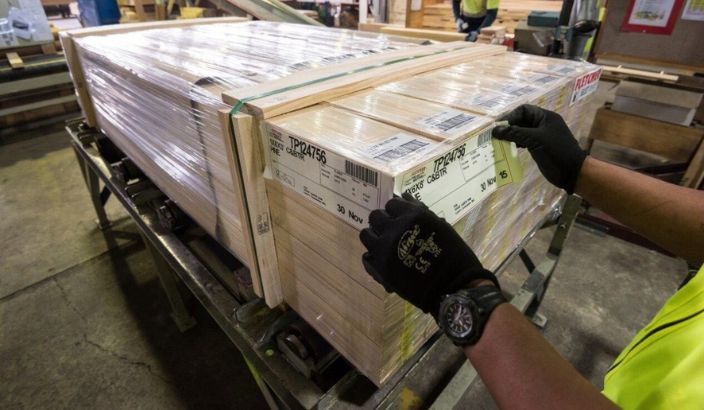Tariffing NZ timber products to the U.S. would be troublesome


Packaged radiata pine boards prepared for export - prized by American DIY and construction markets for their consistent quality and performance. Photo: Supplied.
Wood Processors and Manufacturers Association of NZ
With a population of 5.2 million people spread over a land area slightly less than the state of Colorado, New Zealand has a strong story to tell about free trade, farming and renewable forestry resources.
No more so than when it comes to endorsing our high-quality softwood timber and lumber products that have gained popularity among American consumers in the home construction industry due to their appearance, superior machining properties and premium quality.
Forests thrive in New Zealand’s climate and the sector supports a year-round harvest – with responsible production central to the industry. Plantation forests are sustainably managed and are dominated by radiata pine, a productive and fast-growing softwood species. Processed outputs from our forest estates range from lumber, pulp and paper, panels, to engineered wood and remanufactured products.
The strength of NZ pine compares favourably with that of most traditional construction lumber species. Appropriate conversion processes ensure that the higher-strength wood fibre near the outside of the log is sawn for building and construction. Our radiata pine is versatile and is excellent for an impressive range of structural and appearance applications. It is easily kiln dried or chemically treated to produce stable and long-lasting products.
Due to limited domestic demand for our wood products, we have always taken great pride in developing relationships and exporting our timber and lumber to overseas markets, such as the United States. In 2024, we exported $US215 million of radiata pine products from New Zealand to the United States making the U.S. our third largest export market for forest products behind China and Australia.
Although the $US215 million is minor when compared to the total global imports of $US2.3 billion of timber and lumber products into the United States, this trade is valued by both the New Zealand producers and the American DIY customers.
New Zealand timber and lumber exporters are known for providing high value wood products into the United States, most of which is sold into the DIY end user’s market, such as Home Depot. Given the healthy relationship between the United States and New Zealand on the trade front, the temporary relief of tariffs on timber and lumber imported into the United States has been welcomed. Though we realise that this tariff exemption could be short lived based on the outcome of the Section 232 investigation aimed at determining the global effects imports of timber, lumber and their derivative products have on the United Sates supply chain. As a small niche supplier of wood products that are needed by the U.S. domestic building market, there is a strong argument for keeping New Zealand timber and lumber imports tariff free to avoid any additional price hikes and further supply chain disruptions.
If tariffs are added to imported New Zealand wood products, this will have a direct impact on the American consumer through price increases and supply availability on articles like clear pine boards, moldings, solid wood sidings and primed product. As one customer in the United States commented “a lot of what we buy from New Zealand we can’t get elsewhere easily, so expect we may have to pay extra, resulting in higher prices for the consumer”.
As an example, clear radiata pine boards are unable to be produced in the United States as no domestic species come from a pruned forestry resource. There is a realisation that due to our low trade barriers and the minimal effect we have on global imports into the United States, that New Zealand is not the target of any new tariffs. However, there is a chance that we will be unintentionally caught up in the tariff effects should they be implemented. With high shipping and production costs, it is anticipated that should a tariff on New Zealand timber and lumber products be imposed then this will lead to higher prices at a time when other building material costs are also on the rise.
From a New Zealand perspective we look upon the temporary tariff exemption on timber and lumber products as a blessing, and we thank our kindred organisations in America, such as the National Association of Home Builders and the Northeastern Retail Lumber Association, for their support in making this happen.
Like many, we now wait for completion of the section 232 Investigation as to what the future holds for imported New Zealand timber and lumber products entering the United States.
